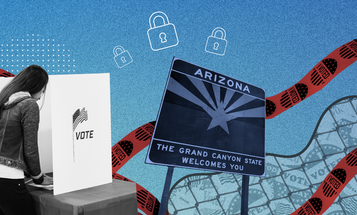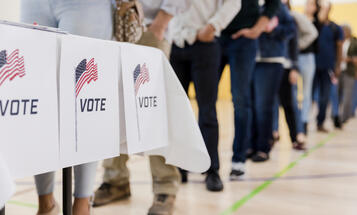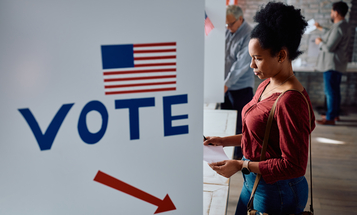
Voting Rights Groups Ensure Low-Income Georgians are (Finally) Provided Voter Registration Services
On April 19th, a coalition of national voting rights groups working on behalf of Georgia residents and advocacy groups secured a landmark settlement to ensure that voter registration opportunities are offered to all public assistance applicants, as is required by the National Voter Registration Act.
This major victory for the voting rights and democratic participation of low-income citizens bucks a national trend of vote suppression aimed at keeping these same vulnerable populations off the rolls and out of the voting booth.
Congress passed the National Voter Registration Act (NVRA) in 1993 to boost democratic participation by helping qualified citizens register to vote through their day-to-day interactions with various government agencies.
The law is commonly known as "Motor Voter" because it requires Departments of Motor Vehicles to offer registration. But, Congress knew that low-income and disabled people are less likely to frequent the DMV, so the NVRA also requires state agencies that administer federal assistance programs (like food stamps, Medicaid, TANF, WIC) to assist their applicants and clients in registering to vote.
Unfortunately many states have neglected their agency registration responsibilities. Election Assistance Commission data have shown a disturbing downward trend in agency-based registrations since the NVRA went into effect in 1995. As time has gone by, practices have slipped, and oversight has lapsed, the number of registrations some states have reported generating has declined by 70% or even 90% since their peak.
The Department of Justice is primarily responsible for enforcing the NVRA. But, unfortunately, neither the Bush nor Obama administration has prioritized enforcement.
With no cop on the beat, some states are flouting the law and millions of public assistance applicants across the country are being denied the voter registration opportunities that Congress intended them to have.
The downward trend in registrations, coupled with lack of action from DOJ, has motivated a coalition of voting rights lawyers to partner with public assistance clients and local voter registration organizations to enforce the law. The groups, including Demos, Lawyers' Committee for Civil Rights Under Law, Project Vote, ACLU, and NAACP, aim to work cooperatively with states to make changes that will help applicants register and bring local policies and practices into compliance with federal law. But, if states won't make improvements voluntarily, the coalition brings lawsuits to vindicate the rights of potential voters who are not being given the proper chance to get on the registration rolls.
These enforcement interventions have been extremely successful in reversing the downward trend in agency-based voter registrations. Nationally, agency-generated applications plummeted nearly 80% from 2.6 million in 1995-1996 to 528,000 in 2005-2006. But, as a result of this effort, applications were up to 1.1 million in 2009-2010.
As this report details, Demos' work in just five states—Ohio, Missouri, North Carolina, Virginia, and Illinois—has led to an additional one million voter registration applications.
The recent settlement with Georgia is the next step in this critical work, as the state showcased the troubling trends cited above.
During the 1995-1996 reporting period the Georgia Department of Human Services (DHS) transmitted more than 100,000 voter registration applications to elections officials; but in 2009-2010 the number of DHS-generated applications had declined to a mere 4,430, a drop of more than 95%. By comparison, in the same period, Georgia received approximately 1,680,000 applications for just one of the public assistance programs (Food Stamps) covered by the NVRA’s voter registration requirements.
The settled lawsuit contended that this trend was due to widespread violations of the state agency provisions of the NVRA. It was brought on behalf of the Georgia State Conference of the NAACP and the Coalition for the Peoples’ Agenda by Demos, Project Vote, Lawyers’ Committee for Civil Rights Under Law, ACLU Voting Rights Project, and Dechert LLP.
Georgia’s Secretary of State and DHS have now agreed to important procedures to ensure compliance with Section 7, which requires that public assistance agency clients be provided with the opportunity to register to vote every time they apply for or renew benefits, or when they submit a change of address. This includes instances where clients interact with the agency both in person and by remote means (by telephone, internet or mail, for example).
The settlement, approved by a federal judge on April 26th, details the specific procedures that Georgia must follow for distributing voter registration applications to public assistance clients during in-person and remote transactions. It also contains a variety of measures aimed at promoting and ensuring NVRA compliance, including voter registration training for public assistance employees, data collection, and a requirement that DHS report its voter registration activities to the coalition to help it monitor the implementation and impact of this settlement.
With this case settled, the coalition moves on to hold other states accountable to the law—such as Pennsylvania where attorneys recently provided notice of an intent to sue failing improvements and Massachusetts where a local citizen and community groups recently filed suit. This work gets more urgent every day as voter registration deadlines for the 2012 election rapidly approach.



